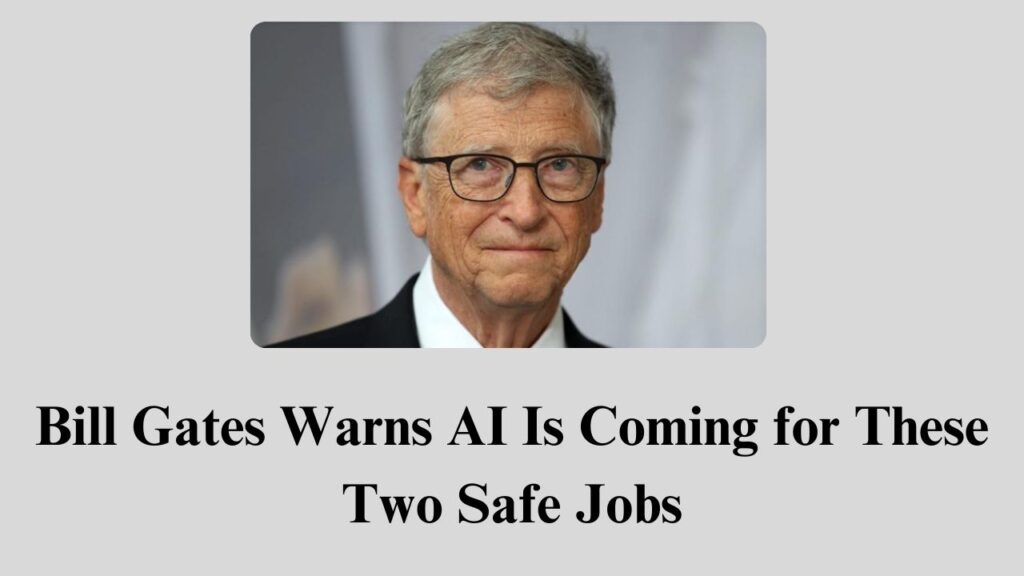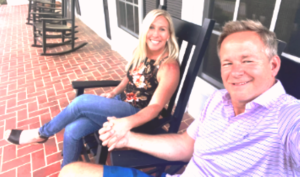Bill Gates Warns AI Is Coming for These Two Safe Jobs
Bill Gates Warns AI Is Coming for These Two Safe Jobs: When people think of the jobs most vulnerable to automation and artificial intelligence, roles like factory work, data entry, or even retail often come to mind. For years, it was assumed that certain professions especially those demanding creativity or deep interpersonal skills were safe from the rise of machines. However, Bill Gates, co-founder of Microsoft and one of the most influential voices in the tech world, has recently made a bold prediction that challenges that assumption. According to Gates, AI is now on track to disrupt two types of jobs that once seemed virtually untouchable: education and healthcare.
This isn’t just idle speculation. Gates has long had his finger on the pulse of emerging technologies and how they shape our lives. His latest remarks shed light on how advanced AI systems particularly large language models like ChatGPT are growing more capable of performing tasks that were once thought to be the exclusive domain of human professionals.
Let’s break down exactly what he meant, why these fields are no longer immune, and what it could mean for the future of work.
AI in Education: The Digital Tutor Revolution
One of the biggest surprises in Gates’ forecast is the suggestion that teachers once thought irreplaceable may soon find themselves sharing space with digital assistants or even AI-powered tutors. For years, it was widely believed that the complex and deeply human task of educating children couldn’t be automated. After all, teaching involves empathy, emotional intelligence, and the ability to adapt to each student’s learning style. But that’s precisely where modern AI is beginning to shine.
Gates points out that AI can now offer personalized tutoring at scale. Imagine a student who struggles with algebra. Rather than waiting for the teacher’s attention in a busy classroom, that student could ask an AI tutor a question and receive an instant, step-by-step explanation tailored specifically to their learning pace. And the AI won’t get tired, impatient, or overlook quieter students in the back of the class.
Already, companies are developing tools that integrate with educational platforms, allowing AI to monitor student performance, recommend learning resources, and provide feedback. This doesn’t mean human teachers will become obsolete overnight, but their roles might shift. They could become more like mentors or facilitators while AI handles the more repetitive or routine instruction.
AI in Healthcare: More Than Just Diagnostics
The second profession Gates highlights is healthcare a field many thought immune to disruption because of its hands-on nature and high stakes. While machines have been used in diagnostics for years, Gates suggests we’re entering a new era where AI won’t just support doctors and nurses it might actually perform core aspects of their jobs.
We’re already seeing glimpses of this future. AI algorithms are now capable of analyzing X-rays, MRIs, and other medical images with remarkable accuracy. Some studies even suggest that AI systems can detect signs of diseases like cancer earlier than human doctors in certain cases. Beyond diagnostics, AI chatbots are being used to triage patients, offer medical advice, and assist with mental health counseling.
But Gates envisions AI playing a much bigger role especially in areas with healthcare worker shortages. In under-resourced communities or developing countries, AI tools could serve as frontline providers of medical information. Imagine an AI assistant guiding a patient through symptom checks, offering lifestyle advice, or even managing chronic conditions like diabetes through regular monitoring and feedback.
This doesn’t mean doctors or nurses will disappear. Instead, their focus may shift toward tasks that require emotional connection, ethical decision-making, and complex case evaluations while AI handles the mountains of data and routine interactions.
Why These Jobs Were Once Thought to Be Safe
What makes Gates’ prediction so striking is the nature of the jobs he’s pointing to. Teaching and healthcare both require a deep understanding of human behavior, strong communication skills, and a high degree of trust. These were all traits many believed AI simply couldn’t replicate. Machines, after all, don’t understand emotion. They don’t have lived experience. They don’t build relationships.
But that line is beginning to blur. AI may not feel emotions, but it can now recognize emotional cues, respond with empathy, and mimic human communication more convincingly than ever before. Tools like ChatGPT have shown they can carry on natural conversations, explain complicated ideas in simple terms, and respond sensitively to user concerns all while drawing from vast amounts of information far beyond any one person’s ability to retain.
What This Means for Workers in These Fields
If you’re a teacher or healthcare professional, Gates’ prediction isn’t necessarily cause for panic but it is a wake-up call. The AI revolution isn’t just about robots taking over factory jobs anymore. It’s about rethinking how we use human skills in a world where machines can assist or even replace certain tasks.
Rather than resisting the wave, the smartest move might be to ride it. Teachers can start exploring how AI can help them offer more personalized support. Healthcare workers can embrace AI tools that streamline administrative work or enhance diagnostic precision. In both cases, humans still offer something AI can’t genuine human connection, moral judgment, and creativity.
The future of work in these fields may not be about being replaced, but being redefined.




